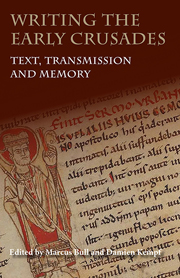Book contents
- Frontmatter
- Contents
- Acknowledgements
- List of Contributors
- List of Abbreviations
- Introduction
- Baldric of Bourgueil and the Familia Christi
- Guibert of Nogent, Albert of Aachen and Fulcher of Chartres: Three Crusade Chronicles Intersect
- Understanding the Greek Sources for the First Crusade
- The Monte Cassino Tradition of the First Crusade: From the Chronica Monasterii Casinensis to the Hystoria de via et recuperatione Antiochiae atque Ierusolymarum
- Nova Peregrinatio: The First Crusade as a Pilgrimage in Contemporary Latin Narratives
- What Really Happened to Eurvin de Créel's Donkey? Anecdotes in Sources for the First Crusade
- Porta Clausa: Trial and Triumph at the Gates of Jerusalem
- The Historia Iherosolimitana of Robert the Monk and the Coronation of Louis VI
- Towards a Textual Archaeology of the First Crusade
- Robert the Monk and his Source(s)
- Rewriting the History Books: The First Crusade and the Past
- The Ideal of Knighthood in English and French Writing, 1100–1230: Crusade, Piety, Chivalry and Patriotism
- Index
Rewriting the History Books: The First Crusade and the Past
Published online by Cambridge University Press: 05 May 2014
- Frontmatter
- Contents
- Acknowledgements
- List of Contributors
- List of Abbreviations
- Introduction
- Baldric of Bourgueil and the Familia Christi
- Guibert of Nogent, Albert of Aachen and Fulcher of Chartres: Three Crusade Chronicles Intersect
- Understanding the Greek Sources for the First Crusade
- The Monte Cassino Tradition of the First Crusade: From the Chronica Monasterii Casinensis to the Hystoria de via et recuperatione Antiochiae atque Ierusolymarum
- Nova Peregrinatio: The First Crusade as a Pilgrimage in Contemporary Latin Narratives
- What Really Happened to Eurvin de Créel's Donkey? Anecdotes in Sources for the First Crusade
- Porta Clausa: Trial and Triumph at the Gates of Jerusalem
- The Historia Iherosolimitana of Robert the Monk and the Coronation of Louis VI
- Towards a Textual Archaeology of the First Crusade
- Robert the Monk and his Source(s)
- Rewriting the History Books: The First Crusade and the Past
- The Ideal of Knighthood in English and French Writing, 1100–1230: Crusade, Piety, Chivalry and Patriotism
- Index
Summary
In c. 1110 a French cleric known as Robert the Monk set out the reasons why he had begun to compose his Historia Iherosolimitana, a Latin prose narrative of the First Crusade that would go on to become the most widely-copied and extensively-circulated history of the expedition in the medieval west. Taking his cue from those historians who had contributed to the composition of the Old and New Testaments, Robert wrote in the Historia's prologue of ‘how pleasing it is to God that a record should be made for his faithful people when he carries out any miraculous work on earth that has been arranged to take place for all time’. He then went on, famously, to identify the First Crusade as being comparable in significance with God's creation of the world and Christ's redemption of mankind on the cross, before offering what seems to be a very personal response to the events of the 1090s:
The more carefully one reflects on it, the more fully is the mind astounded by it. For this was not the work of men; it was the work of God. And so it ought to be commended in writing, as much for the present as for the future, so that Christians will have their hope in God strengthened; and so that they will be encouraged to praise him more eagerly in their minds.
- Type
- Chapter
- Information
- Writing the Early CrusadesText, Transmission and Memory, pp. 140 - 154Publisher: Boydell & BrewerPrint publication year: 2014

